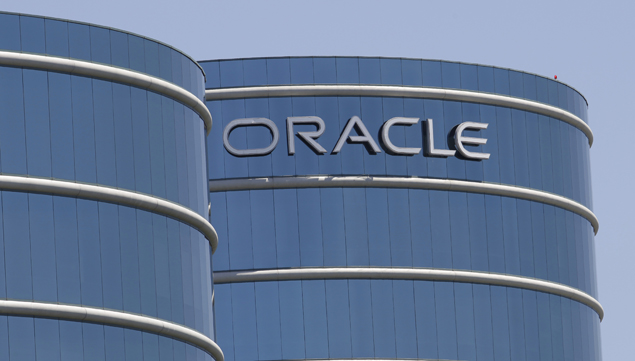- Home
- Laptops
- Laptops News
- Oracle's Q1 earnings rise 11 percent despite decline in hardware sales
Oracle's Q1 earnings rise 11 percent despite decline in hardware sales

The quarterly results announced Thursday provided the latest indication that companies and government agencies are clamping down on technology spending until they get a better sense of where the economy is heading.
The decision-makers in technology departments have been especially reluctant to invest in new personal computers and other expensive hardware. That trend has caused leading PC manufacturers such as Hewlett-Packard. Co. and Dell Inc., and a range of microprocessor makers to report disappointing numbers and bleak outlooks.
Oracle's specialty, though, is database software and applications that automate administrative tasks - products that so far are still generating higher sales even in uncertain times. That helped Oracle boost its revenue from new software and online subscriptions by 5 percent from the same time last year, an encouraging sign because those licenses hatch more moneymaking opportunities in the form of future upgrades and maintenance fees.
In a particularly heartening sign, Oracle predicted its sales of software licenses and subscriptions in the current quarter will climb by 5 percent to 15 percent from the same time last year.
But Oracle is also trying to muscle its way into the computer server market, a foray punctuated by its $7.3 billion acquisition of Sun Microsystems in 2010. The expansion hasn't paid off yet, although Oracle executives have pledged it will prove to be a lucrative move. In its most recent quarter, Oracle's hardware revenue plunged 19 percent from the same time last year.
The erosion dragged down Oracle's overall numbers for its fiscal first quarter, a three-month period spanning from June through August. Like many U.S. companies that depend on overseas customers for a lot of their sales, Oracle was hurt by weakened currencies in Europe and other parts of the world. The currency fluctuations translated into fewer dollars during the latest quarter compared to a year ago.
Oracle Corp. earned $2.03 billion, or 41 cents, per share in the quarter. That's an 11 percent increase from net income of $1.84 billion, or 36 cents per share, at the same time last year.
Excluding certain accounting items, the company said it would have earned 53 cents per share, mirroring the average projection of analysts surveyed by FactSet.
Total revenue dipped 2 percent from last year to $8.18 billion. That was more than $200 million below analyst forecasts.
Oracle's fiscal first quarter is typically sluggish because it falls during the summer when deals are tougher to close because of vacations.
The sales decline in the past quarter might have been more worrisome if not for Oracle's projection for the current quarter ending in November. The company, which is based in Redwood Shores, Calif., foresees its revenue at worst remaining unchanged from last year and perhaps rising by as much as 4 percent.
Assuming Oracle's results come in at the mid-point of that forecast, the company's revenue in the current quarter will be about $9 billion. That's about $200 million under current analyst projections.
Excluding costs for past acquisitions and stock paid to its employees, Oracle expects its earnings in the current quarter to range from 59 cents to 63 cents. Analysts forecast 61 cents per share.
Oracle shares initially fell by as much as $1.21 in extended trading after the fiscal first-quarter numbers came out, but bounced back as investors digested the numbers and listened to management's heartening remarks. By late Thursday, Oracle's stock price had edged up 12 cents to $32.38 in extended trading.
Get your daily dose of tech news, reviews, and insights, in under 80 characters on Gadgets 360 Turbo. Connect with fellow tech lovers on our Forum. Follow us on X, Facebook, WhatsApp, Threads and Google News for instant updates. Catch all the action on our YouTube channel.
Related Stories
- Samsung Galaxy Unpacked 2026
- iPhone 17 Pro Max
- ChatGPT
- iOS 26
- Laptop Under 50000
- Smartwatch Under 10000
- Apple Vision Pro
- Oneplus 12
- OnePlus Nord CE 3 Lite 5G
- iPhone 13
- Xiaomi 14 Pro
- Oppo Find N3
- Tecno Spark Go (2023)
- Realme V30
- Best Phones Under 25000
- Samsung Galaxy S24 Series
- Cryptocurrency
- iQoo 12
- Samsung Galaxy S24 Ultra
- Giottus
- Samsung Galaxy Z Flip 5
- Apple 'Scary Fast'
- Housefull 5
- GoPro Hero 12 Black Review
- Invincible Season 2
- JioGlass
- HD Ready TV
- Latest Mobile Phones
- Compare Phones
- Tecno Pova Curve 2 5G
- Lava Yuva Star 3
- Honor X6d
- OPPO K14x 5G
- Samsung Galaxy F70e 5G
- iQOO 15 Ultra
- OPPO A6v 5G
- OPPO A6i+ 5G
- Asus Vivobook 16 (M1605NAQ)
- Asus Vivobook 15 (2026)
- Brave Ark 2-in-1
- Black Shark Gaming Tablet
- boAt Chrome Iris
- HMD Watch P1
- Haier H5E Series
- Acerpure Nitro Z Series 100-inch QLED TV
- Asus ROG Ally
- Nintendo Switch Lite
- Haier 1.6 Ton 5 Star Inverter Split AC (HSU19G-MZAID5BN-INV)
- Haier 1.6 Ton 5 Star Inverter Split AC (HSU19G-MZAIM5BN-INV)







![[Partner Content] OPPO Reno15 Series: AI Portrait Camera, Popout and First Compact Reno](https://www.gadgets360.com/static/mobile/images/spacer.png)









